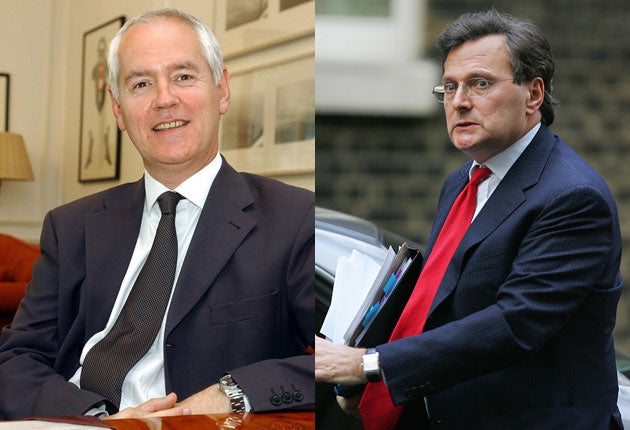DPP was warned hacking was rife at Murdoch paper

The former Director of Public Prosecutions (DPP) Lord Macdonald was warned by his own employees as far back as 2006 that there were a "vast array" of News of the World phone-hacking victims.
Lord Macdonald, who has since been hired by the newspaper's owner, Rupert Murdoch, was sent a memo nearly six months before the reporter Clive Goodman and the private investigator Glenn Mulcaire were convicted, revealing that the charges they were facing related to just a fraction of the potential victims.
However, the hacking investigation was never widened despite pressure on the police and Lord Macdonald, the head of the Crown Prosecution Service at the time, to do so.
In a letter released yesterday, the former Attorney General Lord Goldsmith revealed: "The Director [of Public Prosecutions] and I were aware that the particular cases referred to were not isolated examples." Lord Goldsmith said protocol prevented him from speaking to the police, but this did not apply to the Crown Prosecution Service, which Lord Macdonald led at the time, and whose lawyers briefed him on other victims of hacking.
The Met had to reopen its inquiries into criminality by the NOTW in January this year when it became apparent that police and prosecutors had failed to fully investigate the widespread phone hacking by the newspaper five years ago.
The revelation is embarrassing for Lord Macdonald because when he examined emails held by News Corp as part of his new job assisting the company's internal investigation earlier this year, he took "three to five minutes" to decide that the material constituted evidence of criminality and needed to be passed to police.
He told the Home Affairs Select Committee last week: "The material I saw was so blindingly obvious that trying to argue that it should not be given to the police would have been a hard task. It was evidence of serious criminal offences."
He added that a police probe into alleged illegal payments to officers could have been launched as far back as 2007.
The memo came to light yesterday in a letter written to the Home Affairs Select Committee by the former Attorney General Lord Goldsmith. In it he said that he had consulted files held by his former department and confirmed that he had been sent a memorandum, prepared by CPS lawyers for both him and the DPP, explaining that there were a "vast array" of other victims of phone hacking in May 2006.
Lord Goldsmith revealed that the memo said the other phone-hacking allegations uncovered could be followed up and that it concluded: "These may be the subject of wider investigation in due course. A number of targets have been informed."
He wrote: "I have no knowledge of why that wider investigation of those other cases may in the result not have proceeded. The committee will need to address such questions to the DPP and the MPS [Metropolitan Police Service].
"My role was not to direct either an investigation or the prosecution."
Meanwhile, the law firm Harbottle & Lewis – which was given access to a large number of NOTW internal emails in 2007 from the accounts of six people, including Goodman and the former editor Andy Coulson – has written to the Commons Culture Committee outlining its role. Its letter could be published as soon as Friday.
The Chancellor, George Osborne, who advised David Cameron to hire Mr Coulson as his spin doctor after he resigned as the NOTW's editor over the scandal, said yesterday that he regretted the appointment.
Yesterday, an editorial committee set up by The Wall Street Journal to answer critics of its coverage of the phone-hacking scandal said the newspaper "could have done a better job" with an interview it published with its proprietor Rupert Murdoch. The committee also said the WSJ had been slower than it should have been in pursuing the story.
So, who should have acted on the evidence?
THE DPP...?
As head of the Crown Prosecution Service (CPS), the Director of Public Prosecutions (DPP – in this case Lord Macdonald) is responsible for deciding whether there is enough evidence for bringing cases to court in England and Wales, writes Nigel Morris, Deputy Political Editor. Police investigating suspected criminal acts submit their conclusions to the CPS, which then judges whether there is a good chance of securing a conviction. High-profile cases, such as allegations of phone hacking, would be referred to the director personally for a decision. Lord Goldsmith's memo confirms that CPS lawyers had considered the allegations in detail. The DPP is constitutionally required to act independently of the Government.
... OR THE ATTORNEY-GENERAL?
The Attorney-General (in this case Lord Goldsmith) is a non-Cabinet minister whose main duty is to act as the Government's chief legal adviser. The role's significance was highlighted in 2003 when Lord Goldsmith finally concluded the planned invasion of Iraq was lawful. The Attorney is also responsible for supervising the Crown Prosecution Service. That means that the Attorney can be "copied in" to the progress in cases considered to be of public concern – but in such instances the Attorney has to act independently of the Government and not share the information with other ministers. All decisions on initiating prosecutions, such as in the phone hacking investigation, are made by the DPP.
Bookmark popover
Removed from bookmarks